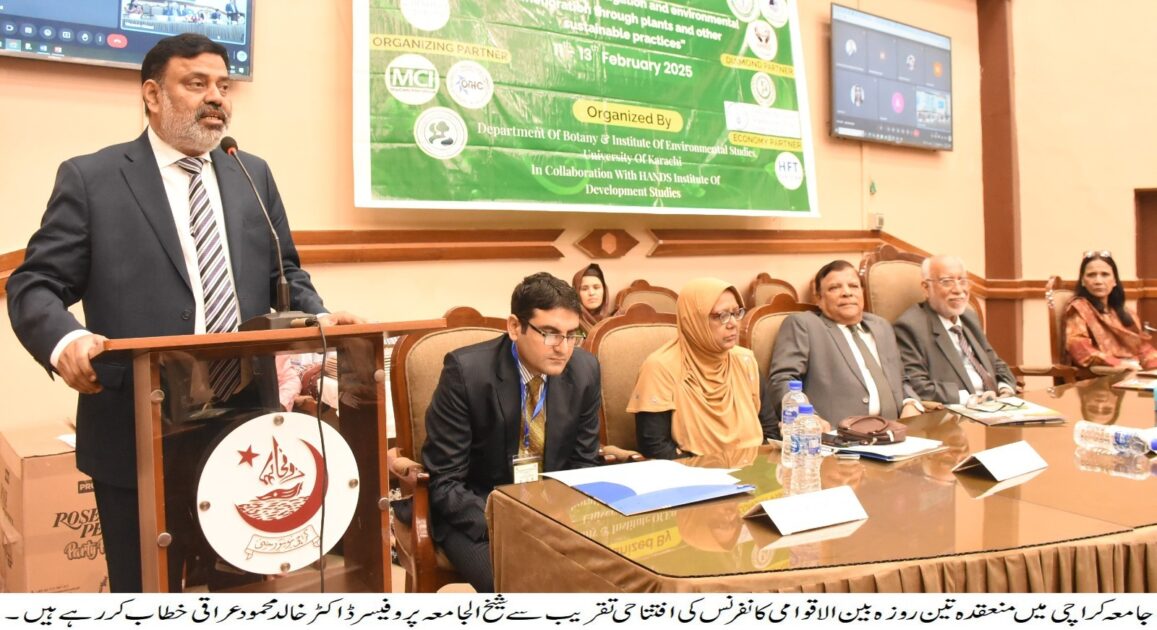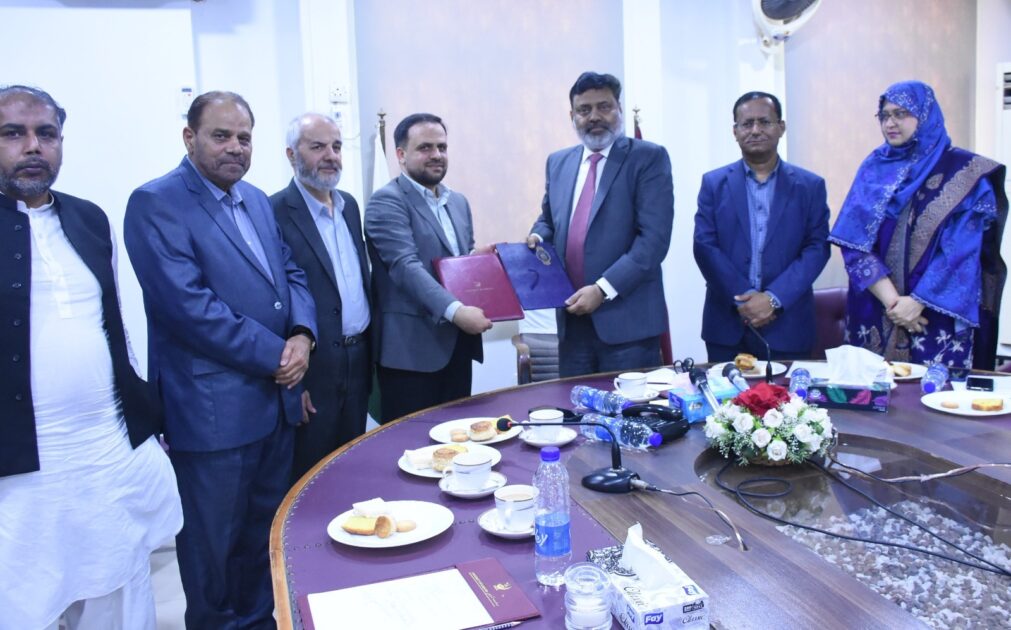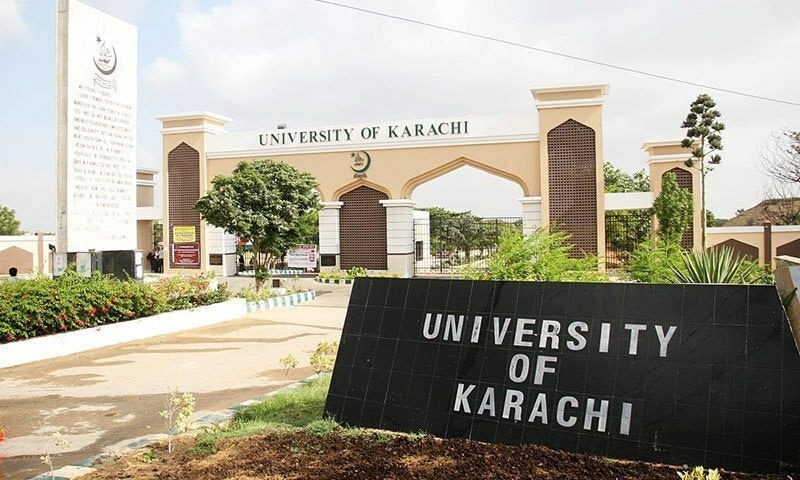- Web Desk
- Jul 09, 2025
KU conference highlights importance of dialogue for sustainable peace in region
-

- Web Desk
- Jun 07, 2024

The Area Study Centre for Europe of the University of Karachi and Rabita International Forum jointly organized a day-long conference titled ‘Future Prospects of Regional Connectivity through Dialogue in South Asia: Global and Strategic Perspectives’ at the National Institute of Management on Wednesday.
The keynote speaker Ambassador (r) Najmuddin Sheikh sketched the history of efforts the diplomatic staff undertook to reach enhance regional cooperation. He reminded the audience that Pakistan had always sought to encourage greater regional connectivity. Touching upon some recent developments, he highlighted the electoral setback the Modi dispensation suffered and whether this particular development would spur the hawks to adopt a more dovish posture towards Islamabad.
He remained highly skeptic of any such thing occurring in the foreseeable future. Moreover, according to him, if the things on the Radcliffe line were completed, the situation on the Durand Line too didn’t fill one with optimism. The Taliban had refused to accept the multi-ethnic nature of Afghan polity coupled with the fact they were not destroying terrorists sanctuaries like those of the Tehreek-e-Taliban Pakistan.
The KU Vice Chancellor Professor Dr Khalid Mahmood Iraqi underscored the necessity of economic and commercial connectivity to provide prosperity and economic security to the masses. Regrettably, our steps had been more cosmetic than practical. We had failed to develop a viable delivering capacity.
He questioned that if the People’s Republic of China and Taiwan could enhance commercial exchanges despite serious political and territorial differences, why the same couldn’t be replicated by states in South Asia. The KU VC Professor Dr Khalid Iraqi also highlighted the need for consistency and rationality.
The KU Dean of Faculty of Arts and Social Sciences Professor Dr Shaista Tabbasum lamented the dysfunctional nature of SAARC and how contemporary crises like climatic catastrophes and energy deficits could have been overcome through greater intra-regional collaboration.
She observed that unfortunately, mistrust between the two biggest actors, Pakistan and India, continued to hamper progress in this regard. The unilateral alteration of the status of Jammu and Kashmir had only contributed in the already deteriorating diplomatic environment.
Earlier, the acting Director of the KU Area Study Centre for Europe Professor Dr Uzma Shujaat emphasized the need to think out of the box as political animosities had left the South Asia the least integrated region in the world. In an era of massive geopolitical shifts around us and the rise of the Asian continent, it was shocking that this region of ours was lagging so much behind in commercial integration.
The first academic session encompassed a variety of topics ranging from South Asian history to making nuclear energy as a tool of regional cooperation. Former ambassador Qazi Muhammad Khalilullah chaired the session. He stated that we had now entered the era of multi-polarity and that Pakistan was the hub of regional connectivity.
The Assistant Professor at Habib University Dr Asad-ur-Rehman read a paper on the challenges in the way of South Asian economic integration. He put his research within the context of center-periphery analytical framework. The Head of Research Department at the Rabita International Forum Syed Samiullah opined that nuclear energy could also be an agent of regional economic cooperation. He stressed on the need of governance frameworks to ensure safe nuclear development. In an answer to a question, Samiullah underlined that Pakistan’s nuclear energy management had been quite efficient as the country had never had to endure accidents like Chernobyl and Fukushima.
An accomplished documentary filmmaker Haya Fatima Iqbal aired one of her short documentary films (Beltoon: The Story of a Separation) whose theme centered on human relations that got severed as a result of political upheavals. Here the context was the partition of subcontinent. An old man living in Loralai, Baluchistan remembered his Hindu acquaintance who had to leave and settle on the other side of the Radcliffe line. Ms. Fatima underscored that the instrument of art could be an extremely useful tool in fostering trans-frontier mutual understanding in a politically vitiated environment.
The final session was chaired by the former KU Chairperson Department of Political Science Dr Tanveer Khalid, and Associate Professor of Bahria University Amir Sultan attempted to apply the model of European integration on south Asia. At the very same time, he recognized that there were many dissimilarities. However, the fact that Europe successfully exorcised its nationalistic demons to open a path in the direction of greater prosperity was one lesson South Asia could take.
The Assistant Professor at FUUAST Dr Faisal Javed examined Russia’s strategic aspirations and engagements in South Asia and its implications for the prospects of regional connectivity. His broader framework was Eurasia. Yet, within the context of Pakistan, he cautioned that at the moment we were too integrated with the Western multilateral structures to make a sudden strategic shift. It would take time.
Assistant Professor of SZABIST Dr Syeda Fizza Batool argued that Pakistan should seek supra-regional and sub-regional integration. The country could act as a bridge connecting South Asia with Europe through the Middle East and Central Asia. The unresolved conflicts between Pakistan and India had been blocking any meaningful progress in this regard. Islamabad’s close ties with Washington had complicated the former’s relationship with Iran. Pakistan should focus on smaller regional groupings and explore areas of mutual interest like infrastructural development, energy trade, and cultural exchanges, which could act as building blocks for a much expansive economic and political cooperation.




